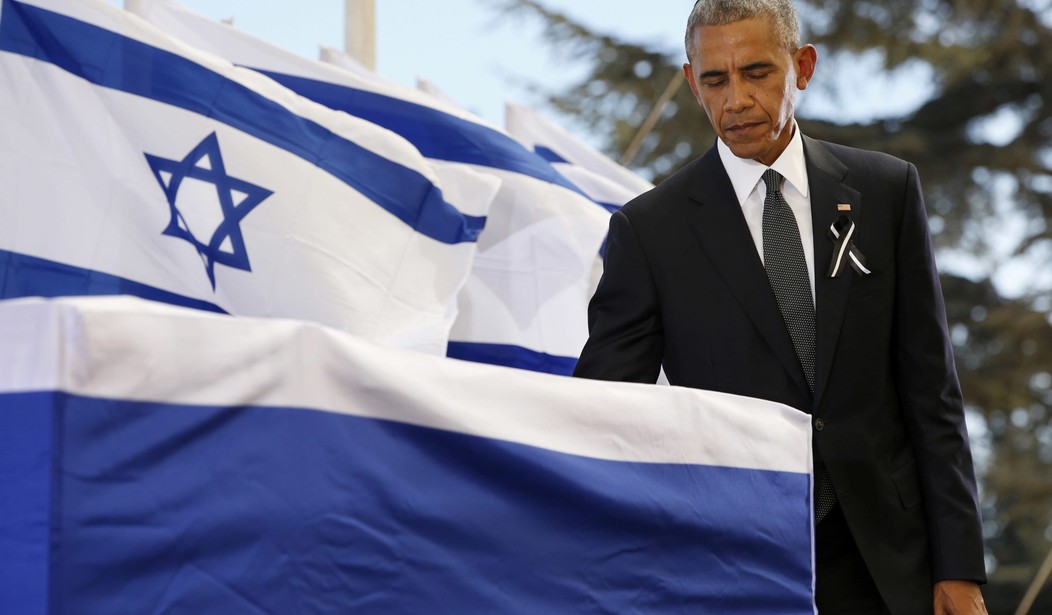President Obama pressed for a Mideast peace plan today in his address at the Jerusalem funeral of former Israeli President Shimon Peres, saying that because of his “understanding of Israel’s meaning, he believed that the Zionist idea would be best protected when Palestinians, too, had a state of their own.”
The White House guidance for Obama’s visit listed the president’s stops in “Tel Aviv, Israel,” but did not say “Israel” after “Jerusalem.”
Wearing a black yarmulke, Obama joined Israeli Prime Minister Benjamin Netanyahu and former President Clinton at the Mount Herzl cemetery.
“For a younger generation, Shimon was probably remembered more for a peace process that never reached its endpoint. They would listen to critics on the left who might argue that Shimon did not fully acknowledge the failings of his nation, or perhaps more numerous critics on the right who argued that he refused to see the true wickedness of the world, and called him naive,” Obama said.
“…He understood, in this war-torn region, where too often Arab youth are taught to hate Israel from an early age — he understood just how hard peace would be. I’m sure he was alternatively angry and bemused to hear the same critics, who called him hopelessly naive, depend on the defense architecture that he himself had helped to build,” he added.
Obama stressed that “out of the hardships of the diaspora, he found room in his heart for others who suffered.”
“He came to hate prejudice with the passion of one who knows how it feels to be its target. Even in the face of terrorist attacks, even after repeated disappointments at the negotiation table, he insisted that as human beings, Palestinians must be seen as equal in dignity to Jews, and must therefore be equal in self-determination,” the president continued.
“…Of course, we gather here in the knowledge that Shimon never saw his dream of peace fulfilled. The region is going through a chaotic time. Threats are ever present. And yet, he did not stop dreaming, and he did not stop working… because our founders planted not just flags in the eternal soil, but also planted the seeds of democracy, we have the ability to always pursue a better world. We have the capacity to do what is right.”
Obama said Peres “accomplished enough things in his life for a thousand men,” but he “understood that it is better to live to the very end of his time on Earth with a longing not for the past but for the dreams that have not yet come true — an Israel that is secure in a just and lasting peace with its neighbors.”
“And so now this work is in the hand of Israel’s next generation, in the hands of Israel’s next generation and its friends,” he added.
Netanyahu called it “no secret that Shimon and I were political rivals, but over time we became friends, close friends.”
“Shimon and I disagreed about many things, but those disagreements never overshadowed our many warm and thoughtful discussions,” he said. “…In one of our nearly night-long discussions, we addressed a fundamental question: From Israel’s perspective, what is paramount—security or peace?”
“Shimon enthusiastically replied, ‘Bibi, peace is the true security. If there will be peace, there will be security.’ And I responded to him, ‘Shimon, in the Middle East, security is essential for achieving peace and for maintaining it.’ The debate intensified. We went back and forth for hours, flinging arguments at one another. He came from the left, I came from the right. I came from the right, and he came back from the left. And in the end – like two worn-out prizefighters – we put down our gloves,” the prime minister continued. “I saw in his eyes, and I think he saw in mine, that our principles stemmed from deep-seeded beliefs and a commitment to the cause – ensuring Israel’s future.”
“My friends, do you know what surprising conclusion I reached with the passage of time? We were both right. In a turbulent Middle East in which only the strong survive, peace will not be achieved other than by permanently preserving our power. But power is not an end in itself. It’s a means to an end. That goal is to ensure our national existence and co-existence. To promote progress, prosperity and peace – for us, for the nations of the region, and for our Palestinian neighbors.”
Netanyahu concluded: “Shimon, my friend, you said that one of the few times you shed a tear was when you heard the tragic news of the death of my brother Yoni in Entebbe. You cried then, Shimon. And today, I weep for you.”
Bill Clinton said Peres “grew his heart to be bigger than his brain, which is really saying something.”









Join the conversation as a VIP Member